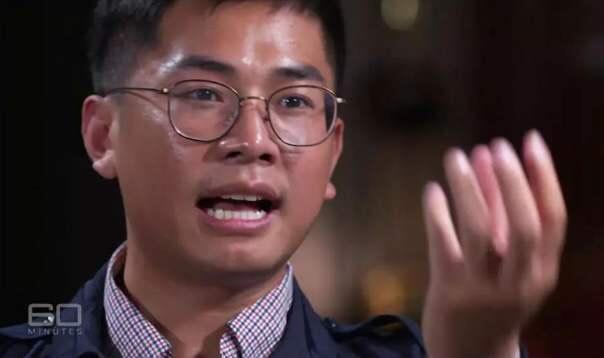
Wang Liqiang receives an interview at Australian news programme 60 Minutes.
This is an editorial from China Daily.
The seemingly explosive spy exposé in Australia was shown on Friday to be what it always was, a damp squib, when the country's Daily Telegraph newspaper ran a report questioning the claims of Wang Liqiang, the self-proclaimed Chinese spy.
Citing sources from the country's security and intelligence agencies, the report said the claims of Wang, who had billed himself as a Chinese spy in control of high-level operations in Taiwan and Hong Kong, as well as Australia, were at best "highly dubious".
In the same vein, media reports in Taiwan last week also raised a series of doubts about Wang's exaggeration and bluffing.
Wang portrayed himself as a spy for China and a key agent creating interference in the political affairs of the two Chinese territories and Australia, with the aim of being granted shelter in Australia. Since, as former Labor Advisor Darrin Barnett said, by claiming to be a defecting spy, the Australian government is "almost obliged to give protection" to him.
But if he is not a spy, what is Wang's real identity? Why should he seek "asylum" in Australia? In fact, the public security authorities in China revealed solid proof more than a week ago that the 26-year-old is a fugitive wanted for fraud. Shanghai police have made public a video clip proving Wang has previously been tried for fraud in Shanghai.
Nonetheless, Wang's sensational claims immediately played into the hands of some China-bashing media and politicians in Australia. In order to add fuel to the ill wind in Australia that has already accused China of interfering in the country's politics and universities, Australia's China-bashers simply reveled in a carnival mood ignited by Wang's false claims without any attempt to verify his stories, as they should have done.
It seems as long as the drama surrounding Wang can be used to pin the tag of interference on China, the media ethics for accuracy and truthfulness, and even human conscience, can be all brushed aside.
A lie is a lie even if it is repeated a thousand times. By consuming Wang's false claims, politicians and media outlets in Australia not only hurt the feelings of Chinese people but also tarnished their own credibility.
Some Australians believe that China wants to have a say in Australian affairs. But they are simply judging China through a biased lens and their own narrow worldview. China sees developing healthy bilateral ties with Australia as serving its interests best, and the same should be true of Australia.
It is high time Australia adopted a more healthy perspective toward China, its largest trading partner.

 中文
中文





